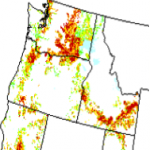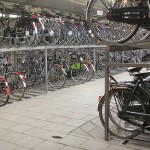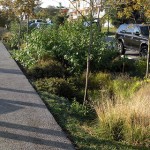Search Results
-
Emancipating the Rooming House
They may not be for you, but rooming houses and other small, basic dwellings should not be against the law. Some people want them — need them, in fact — and they provide housing affordably, with a tiny ecological footprint, and in walkable neighborhoods. Yet across most of the metropolitan Northwest, these basic homes are currently forbidden or rendered unprofitable by local codes. My last article recounted how we arrived...Read more » -
Belly-Up Fish and Other Stormwater Mayhem
It’s a challenge to drive home the importance of controlling polluted runoff. After all, what is stormwater but rain that’s hit the ground? The trouble is, the ground isn’t always such a clean place, particularly in urban areas with lots of roads, rooftops, and parking lots that repel the rain and send it gushing through gutters, picking up pollutants and trash along the way. Still, it’s tough to imagine how...Read more » -
Proof That Car-Sharing is Cheaper Than Free
When you say “greenhouse gas marginal abatement cost curve” I say “where do I sign up?” I guess that’s why I was interested in Oregon’s look at the cost-effectiveness of various carbon reduction strategies. Despite the fact that the new analysis weighs in at over 400 pages and is tangled up with altogether too much econowonk-speak, there are a few pretty interesting findings. Chief among them: car sharing ranks as the...Read more » -
Farm Workers, Arctic Tribes, and Pesticides on Northwest Crops
Fifty years ago this last month, Silent Spring hit the shelves. The book that is sometimes credited with sparking the environmental movement in the United States pitted author Rachel Carson against the manufacturers of dangerous pesticides. Although Carson’s book fundamentally changed the public debate about chemical pollution, it has taken decades for many of her recommendations to gain the force of law. Now, five decades later, the revolution launched by...Read more » -
Shifting Bike-and-Ride into Higher Gear
Most of us are familiar with park-and-ride facilities: large parking lots surrounding transit stops. They generally expand the effective “reach” of a transit stop by allowing people to combine automobiles and transit in a single trip. Yet they also have several disadvantages, including negative visual impacts, forgone revenue from other uses of the space, and the cost of the facilities themselves. There is a better way. In contrast to park-and-rides,...Read more » -
Weekend Reading 8/24/12
Clark: From Oregon Public Broadcasting, news of a new trend in Portland: housing without parking. It’s a major boon for affordability: according to one developer, the cost of providing parking makes “the difference between a $750 apartment and a $1,200 apartment. Or, the difference between apartments and condos.” And in more awesome news from the Rose City, the Oregon legislature has moved to allow Portland to create a network of...Read more » -
Promise of Permeable Pavement
Editor’s note: This post is also available as a pdf. Permeable pavement is one of the most promising green solutions that can help reduce and clean up polluted stormwater runoff. Like conventional pavement, it can be made of asphalt or concrete that’s either poured in place or sold as pavers, and it can be used in a variety of settings, including on parking lots, low-traffic roadways, driveways, and sidewalks. Permeable...Read more » -
Weekend Reading 6/15/12
Eric dP: I’ve got a pair of good suggestions this week. In the Vancouver Observer, Barry Saxifrage looks at national emissions trends and reveals that the world leader is—it’s hard to believe it, but it’s true—the United States. And as he points out, US reductions are no small potatoes: How big is a cut of 430 million tonnes of CO2? It’s equal to all CO2 from all Canadians outside Alberta....Read more » -
Can Seattle Make Sustainability Legal?
Seattle is a city paved with good intentions. Take a look at our plans and our resolutions and you’ll find three values common to just about everybody here, political leaders and residents alike: economic opportunity, environmental leadership, and social justice. That’s what we say, and I think we mean it. It’s just that we don’t always do such a good job of living up to our aspirations. For years—for decades,...Read more » -
Where Are the Women Bike Commuters?
Why don’t women bike to work more often? You hear many theories: we’re less willing to ride in traffic, we can’t arrive at a showerless office all sweaty, we never bothered to learn how to fix a flat, our schedules are over-extended, we work longer hours to make the same money as men, those of us with kids spend twice as much time on average caring for them, and many...Read more »








